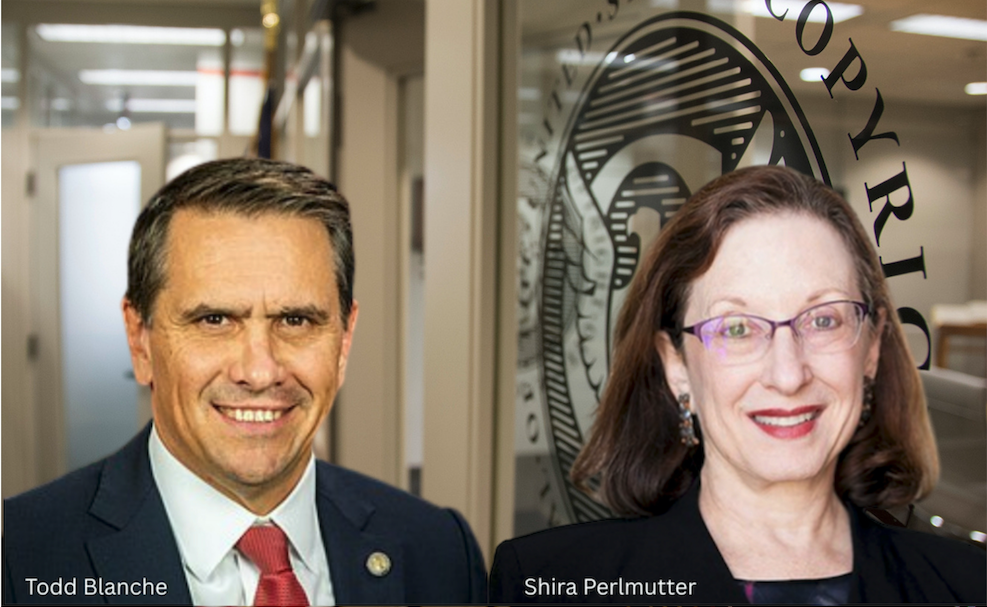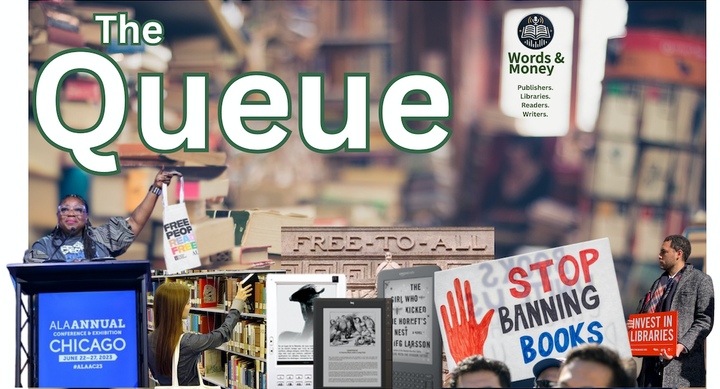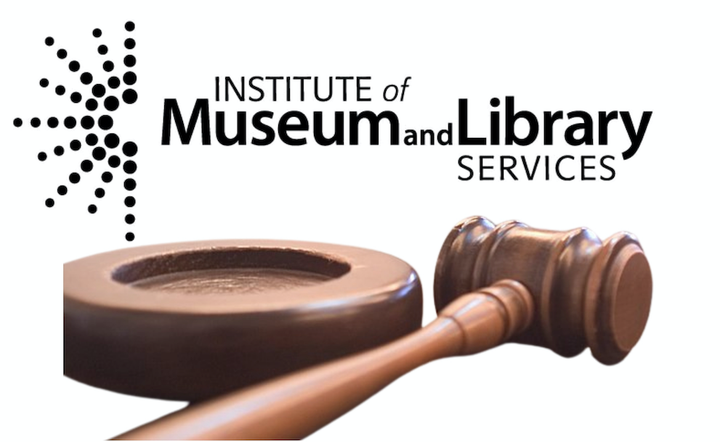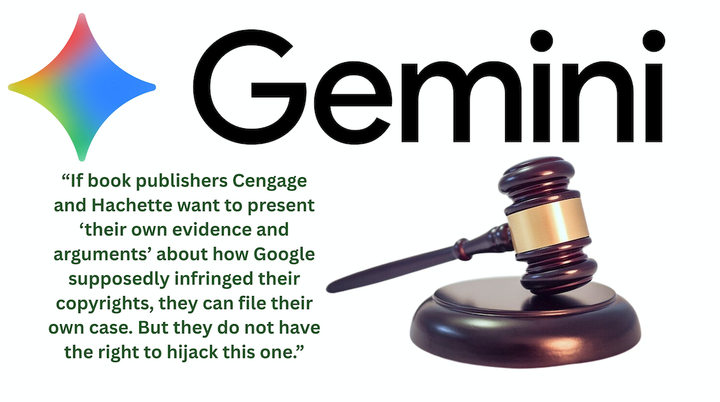In New Filing, DOJ Defends Trump's Bid to Take Over the Library of Congress, and to Fire the Register of Copyrights
After a recent appeals court decision, Register of Copyrights Shira Perlmutter is back at work. But in a head-spinning September 22 motion for summary judgment, DOJ lawyers insist that, one way or another, her purported firing was legal.

Nearly two weeks after an appeals court barred the Trump administration from “interfering” with Register of Copyrights Shira Perlmutter’s employment at the U.S. Copyright Office, DOJ lawyers this week pressed on with their legal case to fire her.
In a September 22 motion for summary judgment, Trump administration lawyers argued that DOJ Deputy Director Todd Blanche, as the “properly serving" Acting Librarian of Congress had the “clear authority to remove the Register of Copyrights," which, the filing states, "he did in designating [DOJ veteran] Paul Perkins as Acting Register.”
But in the very next sentence, the filing confusingly states that it was Trump who fired Perlmutter, which, DOJ lawyers argue, was “within his constitutional power when, as at that time, there was no Librarian.”
Adding to the confusion, DOJ lawyers admitted in a separate filing that Blanche has not in fact assumed control of the Library of Congress, nor has Paul Perkins assumed control of Copyright Office. No matter, the filing argues. One way or another, whether it was Blanche or Trump, the administration's actions must be legal, because some of the Register's duties are executive branch in nature.
“The general rule is that the power to remove tracks the power to appoint. Thus, the Librarian normally has the power to remove the Register. But if there is no Librarian and the President cannot designate an Acting Librarian (as Plaintiff argues), the President’s removal authority extends to inferior officers like the Register,” the filing goes on to argue, presenting an expansive, novel theory of a President's power over the federal workforce.
Jonathan Band, a lawyer for the library community, agreed that the DOJ's arguments in the case are difficult to follow.
"The situation is confusing, which forces the Justice Department to make arguments in the alternative, which further the confusion," Band told Words & Money. "All this confusion could have been avoided by following existing procedures rather than inventing new ones on the fly. There was no emergency requiring this disruptive course of action."
The DOJ’s head spinning motion for summary judgment comes after attorneys for Perlmutter filed their own motion for summary judgment on September 8, meaning that the legal drama at the Copyright Office is finally being litigated on the merits.
In their brief, lawyers for Perlmutter called the administration's actions "a lawless attempt to seize control of the Library of Congress and the U.S. Copyright Office," and argued that her purported May 10 removal was illegal.
"At bottom, neither the President nor Mr. Blanche has the legitimate
authority to displace Ms. Perlmutter from her position as Register of Copyrights," Perlmutter argues. "Contrary to Defendants’ previously stated concerns, there is a clear chain of command at the Library: the President supervises the Acting Librarian (by virtue of the President’s ability to remove the acting Librarian), who, in turn, supervises the Register. And, equally obviously, if the President prefers not to work within the Library’s line of succession, he may nominate and seek confirmation of any person he chooses to the Librarian position. He has not done so."
The litigation was first filed on May 22 after Perlmutter was axed via email on Saturday, May 10, just days after the shock firing of Librarian of Congress Carla Hayden.
Perlmutter's firing has also set off alarm bells, as it immediately followed her decision to release a pre-print edition of a Copyright Office report on copyright and AI, which expressed views with which the President disagrees.
Getting to the Merits
The dueling motions for summary judgment also come as the U.S. Court of Appeals in Washington D.C on September 10 found that district court judge Timothy Kelly erred in not blocking the administration's attempts to remove Perlmutter.
In their 2-1 decision, the appeals court found that Perlmutter was likely to succeed in her legal challenge.
“The Librarian of Congress—not the President—is authorized by statute to appoint the Register. And because the governing statute is silent regarding the question of removal, the Librarian—not the President—has the power to remove Perlmutter,” wrote appeals court judge Florence Pan, in a concurrence for the majority.
Furthermore, Pan also held that the appointment of Blanche as Acting Librarian of Congress was likely unlawful, and dispatched with one of the administration’s key arguments: that the Library of Congress is an executive agency that falls under the Federal Vacancies Reform Act (FVRA)—a statute that allows the President to appoint “another Senate-confirmed official” in an acting “principal officer” role at an executive agency.
"The plain language of the statute indicates that the Library of Congress is not an ‘executive agency’ for purposes of the FVRA,” Pan held in her concurrence, calling the FVRA an “unavailing workaround” for the administration.
The appeals court decision came after Kelly, a Trump appointee, held that Perlmutter had not shown that "the existence of the Copyright Office is at stake, or that her position will likely be irreparably changed without an injunction," without addressing the legality of her firing.
Notably, the key points of the DOJ's summary judgment motion stand in stark opposition to the appeals court's recent findings: Blanche’s appointment as acting Librarian was “lawful,” the filing insists, and the Library of Congress is an “executive agency” subject to the FVRA.
“The Librarian is appointed by the President, and the Library exercises quintessential executive powers, including through the operations of the Copyright Office. Therefore, the Library of Congress is an ‘establishment in the executive branch,’ and the President’s designation of Mr. Blanche as acting Librarian was authorized by the FVRA,” the filing states.
The filing also argues that the appeals court panel got it wrong in allowing Perlmutter to remain on the job, thus the district court is free to ignore the appeals court findings. "The panel’s preliminary view of the merits is not binding on this Court," the filing argues, "and should not be persuasive either given the panel’s refusal to adhere to binding D.C. Circuit precedent."
But, even if the district court finds that the appointments of Blanche (and thus Perkins) are not lawful, DOJ attorneys go on to argue that the constitution necessarily gives the President extraordinarily broad authority to hire and fire officials at the library, and, by extension, other similarly situated federal agencies like the Copyright Office.
“To the extent the FVRA does not apply, the President’s constitutional power to supervise the Library is greater—not less,” the DOJ brief argues. “The President has the constitutional power—indeed, the obligation—to ‘take care that the laws be faithfully executed.’ That power includes the power to designate subordinate officials to supervise components of the Executive Branch when they are otherwise leaderless.”
On its face, however, that argument appears dubious. Beyond the question of whether the Library of Congress or the Copyright Office are executive agencies, neither is leaderless. Carla Hayden's first deputy Robert Newlen, by statute, automatically ascended to the role of Acting Librarian of Congress upon Carla Hayden’s firing, lawyers say, and has been openly serving in that capacity since. And despite Trump's efforts, Perlmutter remains the legally appointed leader of the U.S. Copyright Office.
Furthermore, the administration's staffing theories are amply refuted by history. For example, as Perlmutter's attorneys note in a footnote in their motion for summary judgment, if Nixon had subscribed to Trump's theories during the Watergate era, "there would have been no need for the Saturday Night Massacre," as Nixon could have just fired special prosecutor Archibald Cox himself.
More on point, there have been several unsuccessful legislative attempts in recent years to explicitly shift control of the U.S. Copyright Office and the position of the Register to the executive branch–efforts that would have been unnecessary if the Trump administration's theories were correct.
Instead, lawyers say that the kind of actions the administration now claims are enabled by the FVRA are in fact exactly what that law was enacted to guard against: specifically, a President firing and hiring political loyalists outside the proper line of succession and the purview of Congress.
Next Steps
Lawyers for Perlmutter now have until October 6 to file a reply to the DOJ’s motion, and the DOJ is due to respond by October 14. A hearing in judge Kelly’s courtroom is set for the week of November 3.
In addition, the DOJ on September 17 petitioned the Appeals court in Washington D.C. Circuit to rehear en banc the court’s September 10 order protecting Perlmutter's job before the full court. As of press time, the court has not ruled on that request.


